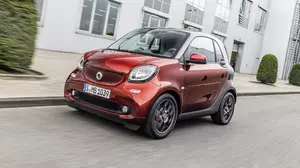
| Vehicle | Precise engine size | Difference from world average | Engine size to consumption ratio | Horsepower from 1 L | Engine size to 100 kg of weight |
|---|---|---|---|---|---|
| 1.0 |
1 L (999 cc) |
57.4% smaller | 18 cc to 1 mpg | 71 hp from 1 L | 111 cc to 100 kg |
| 0.9 |
0.9 L (898 cc) |
61.7% smaller | 16 cc to 1 mpg | 100 hp from 1 L | 100 cc to 100 kg |
| Brabus 0.9 |
0.9 L (898 cc) |
61.7% smaller | 17 cc to 1 mpg | 121 hp from 1 L | 90 cc to 100 kg |
| Vehicle | 1.0 |
|---|---|
| Precise engine size | 1 L (999 cc) |
| Difference from world average | 57.4 smaller |
| Engine size to consumption ratio | 18 cc to 1 mpg |
| Horsepower from 1 L | 71 hp from 1 L |
| Engine size to 100 kg of weight | 111 cc to 100 kg |
| Vehicle | 0.9 |
| Precise engine size | 0.9 L (898 cc) |
| Difference from world average | 61.7 smaller |
| Engine size to consumption ratio | 16 cc to 1 mpg |
| Horsepower from 1 L | 100 hp from 1 L |
| Engine size to 100 kg of weight | 100 cc to 100 kg |
| Vehicle | Brabus 0.9 |
| Precise engine size | 0.9 L (898 cc) |
| Difference from world average | 61.7 smaller |
| Engine size to consumption ratio | 17 cc to 1 mpg |
| Horsepower from 1 L | 121 hp from 1 L |
| Engine size to 100 kg of weight | 90 cc to 100 kg |
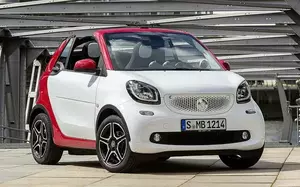
| Vehicle | Precise engine size | Difference from world average | Engine size to consumption ratio | Horsepower from 1 L | Engine size to 100 kg of weight |
|---|---|---|---|---|---|
| 1.0 |
1 L (999 cc) |
57.4% smaller | 18 cc to 1 mpg | 71 hp from 1 L | 111 cc to 100 kg |
| 0.9 |
0.9 L (898 cc) |
61.7% smaller | 16 cc to 1 mpg | 100 hp from 1 L | 100 cc to 100 kg |
| Brabus 0.9 |
0.9 L (898 cc) |
61.7% smaller | 18 cc to 1 mpg | 121 hp from 1 L | 90 cc to 100 kg |
| Vehicle | 1.0 |
|---|---|
| Precise engine size | 1 L (999 cc) |
| Difference from world average | 57.4 smaller |
| Engine size to consumption ratio | 18 cc to 1 mpg |
| Horsepower from 1 L | 71 hp from 1 L |
| Engine size to 100 kg of weight | 111 cc to 100 kg |
| Vehicle | 0.9 |
| Precise engine size | 0.9 L (898 cc) |
| Difference from world average | 61.7 smaller |
| Engine size to consumption ratio | 16 cc to 1 mpg |
| Horsepower from 1 L | 100 hp from 1 L |
| Engine size to 100 kg of weight | 100 cc to 100 kg |
| Vehicle | Brabus 0.9 |
| Precise engine size | 0.9 L (898 cc) |
| Difference from world average | 61.7 smaller |
| Engine size to consumption ratio | 18 cc to 1 mpg |
| Horsepower from 1 L | 121 hp from 1 L |
| Engine size to 100 kg of weight | 90 cc to 100 kg |
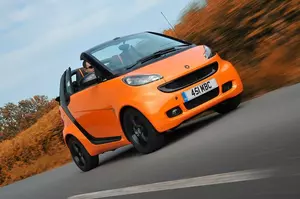
| Vehicle | Precise engine size | Difference from world average | Engine size to consumption ratio | Horsepower from 1 L | Engine size to 100 kg of weight |
|---|---|---|---|---|---|
| 1.0i |
1 L (999 cc) |
57.4% smaller | 22 cc to 1 mpg | 98 hp from 1 L | 125 cc to 100 kg |
| 0.8d |
0.8 L (799 cc) |
65.9% smaller | 12 cc to 1 mpg | 56 hp from 1 L | 100 cc to 100 kg |
| Vehicle | 1.0i |
|---|---|
| Precise engine size | 1 L (999 cc) |
| Difference from world average | 57.4 smaller |
| Engine size to consumption ratio | 22 cc to 1 mpg |
| Horsepower from 1 L | 98 hp from 1 L |
| Engine size to 100 kg of weight | 125 cc to 100 kg |
| Vehicle | 0.8d |
| Precise engine size | 0.8 L (799 cc) |
| Difference from world average | 65.9 smaller |
| Engine size to consumption ratio | 12 cc to 1 mpg |
| Horsepower from 1 L | 56 hp from 1 L |
| Engine size to 100 kg of weight | 100 cc to 100 kg |
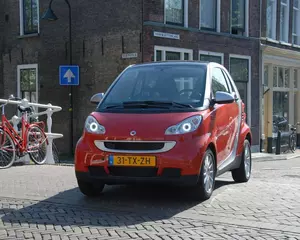
| Vehicle | Precise engine size | Difference from world average | Engine size to consumption ratio | Horsepower from 1 L | Engine size to 100 kg of weight |
|---|---|---|---|---|---|
| 1.0i |
1 L (999 cc) |
57.4% smaller | 22 cc to 1 mpg | 98 hp from 1 L | 125 cc to 100 kg |
| 0.8 cdi |
0.8 L (799 cc) |
65.9% smaller | 11 cc to 1 mpg | 56 hp from 1 L | 100 cc to 100 kg |
| Vehicle | 1.0i |
|---|---|
| Precise engine size | 1 L (999 cc) |
| Difference from world average | 57.4 smaller |
| Engine size to consumption ratio | 22 cc to 1 mpg |
| Horsepower from 1 L | 98 hp from 1 L |
| Engine size to 100 kg of weight | 125 cc to 100 kg |
| Vehicle | 0.8 cdi |
| Precise engine size | 0.8 L (799 cc) |
| Difference from world average | 65.9 smaller |
| Engine size to consumption ratio | 11 cc to 1 mpg |
| Horsepower from 1 L | 56 hp from 1 L |
| Engine size to 100 kg of weight | 100 cc to 100 kg |
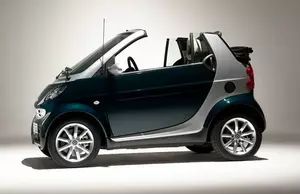
| Vehicle | Precise engine size | Difference from world average | Engine size to consumption ratio | Horsepower from 1 L | Engine size to 100 kg of weight |
|---|---|---|---|---|---|
| 0.7 i |
0.7 L (698 cc) |
70.2% smaller | 14 cc to 1 mpg | 87 hp from 1 L | 87 cc to 100 kg |
| 0.7i Brabus |
0.7 L (698 cc) |
70.2% smaller | 16 cc to 1 mpg | 107 hp from 1 L | 87 cc to 100 kg |
| 0.8d |
0.8 L (799 cc) |
65.9% smaller | 13 cc to 1 mpg | 51 hp from 1 L | 100 cc to 100 kg |
| Vehicle | 0.7 i |
|---|---|
| Precise engine size | 0.7 L (698 cc) |
| Difference from world average | 70.2 smaller |
| Engine size to consumption ratio | 14 cc to 1 mpg |
| Horsepower from 1 L | 87 hp from 1 L |
| Engine size to 100 kg of weight | 87 cc to 100 kg |
| Vehicle | 0.7i Brabus |
| Precise engine size | 0.7 L (698 cc) |
| Difference from world average | 70.2 smaller |
| Engine size to consumption ratio | 16 cc to 1 mpg |
| Horsepower from 1 L | 107 hp from 1 L |
| Engine size to 100 kg of weight | 87 cc to 100 kg |
| Vehicle | 0.8d |
| Precise engine size | 0.8 L (799 cc) |
| Difference from world average | 65.9 smaller |
| Engine size to consumption ratio | 13 cc to 1 mpg |
| Horsepower from 1 L | 51 hp from 1 L |
| Engine size to 100 kg of weight | 100 cc to 100 kg |
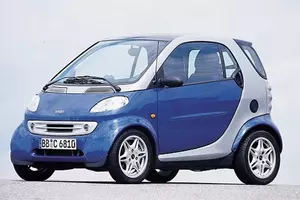
| Vehicle | Precise engine size | Difference from world average | Engine size to consumption ratio | Horsepower from 1 L | Engine size to 100 kg of weight |
|---|---|---|---|---|---|
| 0.6i |
0.6 L (599 cc) |
74.5% smaller | 12 cc to 1 mpg | 75 hp from 1 L | 75 cc to 100 kg |
| 0.7 i |
0.7 L (698 cc) |
70.2% smaller | 14 cc to 1 mpg | 71 hp from 1 L | 87 cc to 100 kg |
| 0.7i Brabus |
0.7 L (698 cc) |
70.2% smaller | 16 cc to 1 mpg | 107 hp from 1 L | 87 cc to 100 kg |
| 0.8d |
0.8 L (799 cc) |
65.9% smaller | 13 cc to 1 mpg | 51 hp from 1 L | 100 cc to 100 kg |
| Vehicle | 0.6i |
|---|---|
| Precise engine size | 0.6 L (599 cc) |
| Difference from world average | 74.5 smaller |
| Engine size to consumption ratio | 12 cc to 1 mpg |
| Horsepower from 1 L | 75 hp from 1 L |
| Engine size to 100 kg of weight | 75 cc to 100 kg |
| Vehicle | 0.7 i |
| Precise engine size | 0.7 L (698 cc) |
| Difference from world average | 70.2 smaller |
| Engine size to consumption ratio | 14 cc to 1 mpg |
| Horsepower from 1 L | 71 hp from 1 L |
| Engine size to 100 kg of weight | 87 cc to 100 kg |
| Vehicle | 0.7i Brabus |
| Precise engine size | 0.7 L (698 cc) |
| Difference from world average | 70.2 smaller |
| Engine size to consumption ratio | 16 cc to 1 mpg |
| Horsepower from 1 L | 107 hp from 1 L |
| Engine size to 100 kg of weight | 87 cc to 100 kg |
| Vehicle | 0.8d |
| Precise engine size | 0.8 L (799 cc) |
| Difference from world average | 65.9 smaller |
| Engine size to consumption ratio | 13 cc to 1 mpg |
| Horsepower from 1 L | 51 hp from 1 L |
| Engine size to 100 kg of weight | 100 cc to 100 kg |